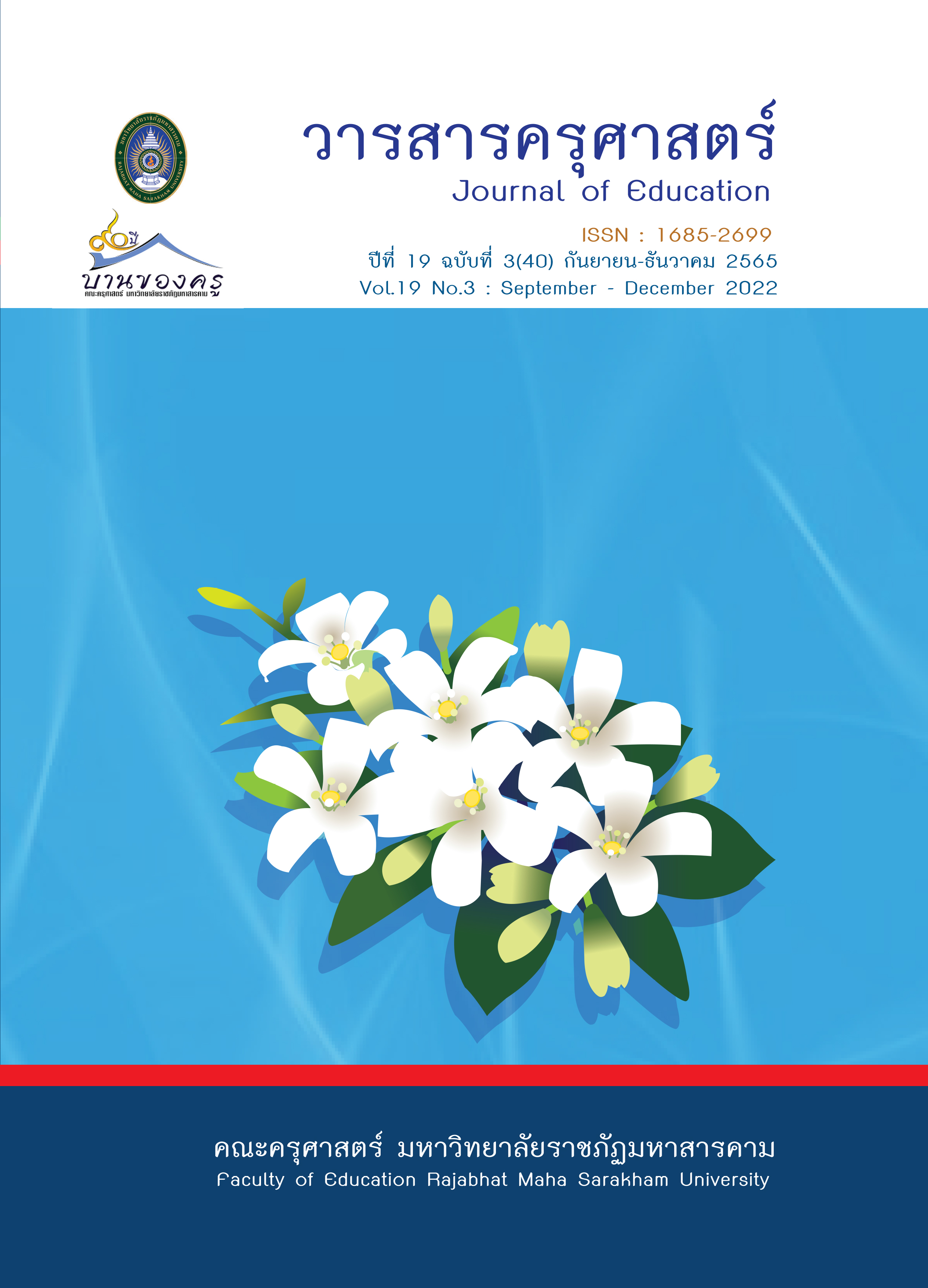The Academic Achievement Promoting through Social Media Supported STAD Collaborative Learning for Pratomsuksa 6 Students at Ban Khok Ko School
Main Article Content
Abstract
This research aimed 1) to study the practice of academic achievement promoting through social media supported STAD collaborative learning applications, 2) to study the academic achievement of the students before and after the social media supported STAD collaborative learning, and 3) to study the students’ satisfaction towards the social media supported STAD collaborative learning. The research was an action research. Target group of this research was a classroom of Prathomsuksa 6 students, in the first semester of academic year 2019, at Ban Khok Ko School, Khok Ko Sub-district, Mueang Maha Sarakham District, Maha Sarakham Province. There were 20 of students in total. The research tools consisted of lesson plans, memorandum form, academic achievement test, and the student satisfaction questionnaire. The data analysis was divided into two methods. Firstly, qualitative data analysis was conducted by analyzing, interpreting, summarizing, and reporting the results in a descriptive format. Secondly, quantitative data analysis was performed using mean, standard deviation and percentage.
Results of the research were as follows: 1) The practice of academic achievement promoting through social media supported STAD collaborative learning included a four-steps of learning process; 1) preparation, 2) teaching, 3) group activity and 4) lesson summary and group work evaluation. 2) The academic achievement of pre-study and post-study have shown 1.33 which was effective according to the Meguigans standard, and 3) The students’ satisfaction towards the social media supported STAD collaborative learning was at the highest level (= 4.8, S.D. = 0.38).
Article Details

This work is licensed under a Creative Commons Attribution-NonCommercial-NoDerivatives 4.0 International License.
ข้อกำหนดเบื้องต้นที่ผู้นิพนธ์(ผู้ส่งบทความ) ควรทราบ
1. ผู้นิพนธ์ที่ประสงค์จะลงตีพิมพ์บทความกับวารสาร ตั้งแต่เดือนมกราคม 2563 เป็นต้นไป ให้ใช้รูปแบบใหม่ (Template 2563) โดยสามารถดูตัวอย่างได้ที่เมนู GUIDELINES
2. จะตีพิมพ์และเผยแพร่ได้ ต้องผ่านการประเมินจากผู้ทรงคุณวุฒิ (Peer Review)
3. การประเมินบทความโดยผู้ทรงคุณวุฒิ (Peer Review) เป็นแบบ Double Blind
4. การอ้างอิงบทความใช้หลักเกณฑ์ APA (American Psychological Association) คลิก
5. บทความถูกปฏิเสธการตีพิมพ์ ไม่ผ่านการประเมิน ผู้นิพนธ์ขอยกเลิกเองหรือชำระเงินก่อนได้รับการอนุมัติ ทางวารสารไม่มีนโยบายการคืนเงิน
References
กระทรวงศึกษาธิการ. (2551). หลักสูตรแกนกลางการศึกษาขั้นพื้นฐานพุทธศักราช 2551. ชุมนุมสหกรณ์การเกษตร
แห่งประเทศไทย.
จงกล เขียนปัญญา. (2561). การจัดการเรียนรู้โดยใช้รูปแบบการเรียนรู้แบบกลุ่มร่วมมือเทคนิคกลุ่มผลสัมฤทธิ์
(STAD) เพื่อส่งเสริมผลสัมฤทธิ์ทางการเรียนรายวิชา การงานอาชีพและเทคโนโลยี ชั้นมัธยมศึกษาปีที่ 2
โรงเรียนโนนโพธิ์ศรีวิทยาคม. วารสารวิชาการการจัดการเทคโนโลยีสารสนเทศและนวัตกรรม, 5(2),127-136.
ชัยวัฒน์ แก้วพันงาม. (2559). เทคโนโลยีเพื่อการประเมินการเรียนรู้ภาษาสาหรับผู้เรียนในศตวรรษที่ 21.
วารสารวิชาการ, 9(3), 436-452.
ธนะวัฒน์ วรรณประภา. (2560). สื่อสังคมออนไลน์กับการศึกษา. วารสารศึกษาศาสตร์ มหาวิทยาลัยมหาสารคาม,
(1),7-20.
พรพรรณ เสาร์คำเมือง. (2562). การศึกษาผลสัมฤทธิ์ทางการเรียนวิชาคณิตศาสตร์ของนักเรียนชั้นประถมศึกษาปีที่ 6
โดยการเรียนรู้แบบร่วมมือ เทคนิค STAD [วิทยานิพนธ์ปริญญามหาบัณฑิต ไม่ได้ตีพิมพ์].
มหาวิทยาลัยศิลปากร.
ภาวินี อ้วนศรีเมือง. (2557). การเปรียบเทียบผลการเรียน เรื่องระบบฐานข้อมูล ของนักเรียนที่เรียนด้วยบทเรียนบน
เว็บร่วมกับการเรียนรู้แบบ TGT และการจัดกิจกรรมการเรียนรู้แบบ STAD ชั้นมัธยมศึกษาปีที่ 5. วารสาร
มหาวิทยาลัยราชภัฏสกลนคร, 6(12), 141-154.
วราพร ดำจับ (2562). สื่อสังคมออนไลน์กับการเรียนรู้ในศตวรรษที่ 21 วารสารศิลปศาสตร์ มหาวิทยาลัยแม่โจ้.
(2),143-159.
สถาบันส่งเสริมการสอนวิทยาศาสตร์และเทคโนโลยี. (2551). หนังสือเรียนสาระการเรียนรู้พื้นฐานคณิตศาสตร์
กลุ่มสาระการเรียนรู้คณิตศาสตร์ ชั้นประถมศึกษาปีที่ 1. โรงพิมพ์ สกสค. ลาดพร้าว.
สำนักงานรับรองมาตรฐานและประเมินคุณภาพการศึกษา (องค์การมหาชน). (2554). แนวทางการประเมิน
คุณภาพตามมาตรฐานการศึกษาขั้นพื้นฐานเพื่อการประกันคุณภาพภายในของสถานศึกษา.
โรงพิมพ์สำนักงานพระพุทธศาสนาแห่งชาติ.
สุนิสา โชติกลาง. (2547). การพัฒนาการจัดการเรียนรู้แบบร่วมมือประเภทกลุ่มแข่งขัน (TGT) เรื่องสารใน
ชีวิตประจำวัน กลุ่มสาระการเรียนรู้วิทยาศาสตร์ ชั้นมัธยมศึกษาปีที่ 1 [การศึกษาค้นคว้าอิสระการศึกษา
มหาบัณฑิต ไม่ได้ตีพิมพ์]. มหาวิทยาลัยมหาสารคาม.


